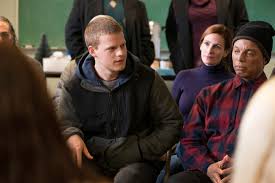Yesterday I watched “Ben is Back” — a recently released feature film about a heroin-addicted young man (Lucas Hedges) and his heroic and tenacious mother (Julia Roberts) who tries her best to keep him “clean.” Ben is around 20 years old (at which age I too was also shooting heroin). He scams a trip home from his residential rehab so that he can spend Christmas with his family.
 Ben seems to be trying with great determination to keep away from drugs. Yet the demon of addiction is doing pushups in the parking lot, just as they warn at the 12-step meeting he attends with his mom. He finds a bag of dope in the attic, but manages to avoid taking it and gives it to his mother instead. He looks the other way when dealers and drug buddies from his former life show up magically on elevators and at car windows.
Ben seems to be trying with great determination to keep away from drugs. Yet the demon of addiction is doing pushups in the parking lot, just as they warn at the 12-step meeting he attends with his mom. He finds a bag of dope in the attic, but manages to avoid taking it and gives it to his mother instead. He looks the other way when dealers and drug buddies from his former life show up magically on elevators and at car windows.  He bravely endures the cultural ambiguity of an American Christmas and tries his best to connect with his sibs and step-sibs. He’s a good guy, and he fights the good fight, but…well I don’t want to spoil it in case you decide to watch it.
He bravely endures the cultural ambiguity of an American Christmas and tries his best to connect with his sibs and step-sibs. He’s a good guy, and he fights the good fight, but…well I don’t want to spoil it in case you decide to watch it.
I thought it was a pretty good movie (I love Julia Roberts) with a half-assed ending, but there were a few impressions I want to share with you — impressions that epitomize a lot of what’s wrong with the mainstream perception of drug addiction.
Although the subtext of the movie is clearly the overdose epidemic, there is hardly a wave at the real causes of overdose deaths: fentanyl in street drugs, drug/alcohol/drug interactions among pharmaceutical users, and impediments to getting methadone or suboxone when needed. (However, to its credit, the film provides a snapshot of the lunacy of pharmacies unwilling to dispense naloxone.) See Maia Szalavitz’s excellent synopsis of what we’re thinking and doing wrong.
 Instead, the usual “Reader’s Digest” simplifications are offered. For example, Mom meets the doctor who first prescribed pain pills, which got Ben “hooked” years ago, and says she hopes he dies a horrible death. We know that the OxyContin surge in the 80’s and 90’s did increase exposure to opiates and fueled increased rates of addiction. But to continue to blame doctors is insane. As Maia Szalavitz (and I) have made clear with arguments and statistics, doctors aren’t the problem, and the result of blaming them is the cutback of pain meds for people who really need them, while driving addicts to the street — to heroin that’s laced or replaced with fentanyl.
Instead, the usual “Reader’s Digest” simplifications are offered. For example, Mom meets the doctor who first prescribed pain pills, which got Ben “hooked” years ago, and says she hopes he dies a horrible death. We know that the OxyContin surge in the 80’s and 90’s did increase exposure to opiates and fueled increased rates of addiction. But to continue to blame doctors is insane. As Maia Szalavitz (and I) have made clear with arguments and statistics, doctors aren’t the problem, and the result of blaming them is the cutback of pain meds for people who really need them, while driving addicts to the street — to heroin that’s laced or replaced with fentanyl.
 The 12-step presence is portrayed somewhat accurately. Both the good (fellowship, honesty, and mutual respect) and the not-so-good (brain washing, propaganda, and the all-or-none trappings of the disease model) correspond well enough with reality.
The 12-step presence is portrayed somewhat accurately. Both the good (fellowship, honesty, and mutual respect) and the not-so-good (brain washing, propaganda, and the all-or-none trappings of the disease model) correspond well enough with reality.
 There is some recognition that addicts have choices. Ben fights his impulses bravely, and he makes sensible choices to avoid contact with the people and places that serve as triggers. And yet there is this creepy sense of fatalism sneaking up on Ben and other addicts. As though whatever choices they think they’re making, they’re bound to succumb. By the way, addiction isn’t referred to as “a disease” in this movie. Yet the miasma of an alien presence or infection lurks behind much of the dialogue and plot.
There is some recognition that addicts have choices. Ben fights his impulses bravely, and he makes sensible choices to avoid contact with the people and places that serve as triggers. And yet there is this creepy sense of fatalism sneaking up on Ben and other addicts. As though whatever choices they think they’re making, they’re bound to succumb. By the way, addiction isn’t referred to as “a disease” in this movie. Yet the miasma of an alien presence or infection lurks behind much of the dialogue and plot.
 Junkies are portrayed as zombies. They are the opposite of clean. They’re dirty. They hover in alleyways, under bridges, around trashcans brimming with burning litter. It’s a classic and grossly overdone stereotype. When I was shooting heroin or morphine in my twenties , garbage-strewn alleys and river banks were not my preferred home away from home.
Junkies are portrayed as zombies. They are the opposite of clean. They’re dirty. They hover in alleyways, under bridges, around trashcans brimming with burning litter. It’s a classic and grossly overdone stereotype. When I was shooting heroin or morphine in my twenties , garbage-strewn alleys and river banks were not my preferred home away from home.
Despite the biases, stereotypes, and omissions, the movie does portray the struggle to avoid temptation rather well. And despite the Hollywood heroism and unlikely confrontations between good and evil, the plot and characters are engaging. The movie may well be worth seeing.
 But here’s my biggest beef. People who take drugs are shown to be occupied by some demonic force (or disease, or what have you) that makes them another species. They are not anything like normal people. They live in a different world, they’re not to be trusted, and they ought to be sent away to residential rehabs (where they won’t infect the rest of us) until the demon is exorcised — itself a rare event. This dichotomous “us vs them” perspective is the real message of the movie.
But here’s my biggest beef. People who take drugs are shown to be occupied by some demonic force (or disease, or what have you) that makes them another species. They are not anything like normal people. They live in a different world, they’re not to be trusted, and they ought to be sent away to residential rehabs (where they won’t infect the rest of us) until the demon is exorcised — itself a rare event. This dichotomous “us vs them” perspective is the real message of the movie.
An alternative message, which I hope you’ve encountered in my posts and the comments and guest posts of others on this blog, is that people who use drugs are so crushed by emotional confusion and pain, much of which is served up by American culture itself, that they seek and sometimes find substances and activities that help them turn down the volume of their anxiety and depression and bring a semblance of  balance to their lives — what I referred to as “substance” last post. The cause of addiction can be found in mall culture itself (portrayed in the movie as a sort of heaven on earth), the rampant commercialism that sucks meaning out of day-to-day life, the often immutable stamp of privilege vs. poverty and the stultifying dead-end lives of those who don’t make the cut. Not to mention the sheer hypocrisy of a society that proclaims Christian values but rewards self-serving, self-protective priorities. I wonder if Ben was infected by these horrors rather than a magical drug high, and whether that’s what made it so hard for him to quit.
balance to their lives — what I referred to as “substance” last post. The cause of addiction can be found in mall culture itself (portrayed in the movie as a sort of heaven on earth), the rampant commercialism that sucks meaning out of day-to-day life, the often immutable stamp of privilege vs. poverty and the stultifying dead-end lives of those who don’t make the cut. Not to mention the sheer hypocrisy of a society that proclaims Christian values but rewards self-serving, self-protective priorities. I wonder if Ben was infected by these horrors rather than a magical drug high, and whether that’s what made it so hard for him to quit.

Leave a Reply